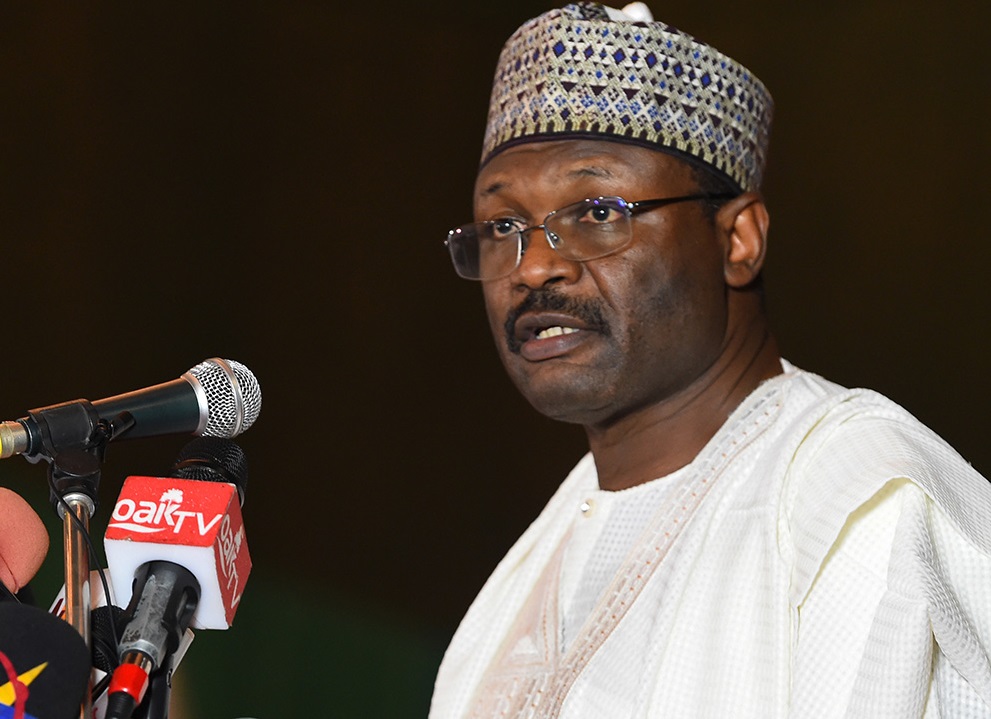POLITICS
Number of cases in courts from conduct of primaries on the increase, says Yakubu

The Chairman of the Independent National Electoral Commission, INEC, Prof. Mahmood Yakubu, says cases in court from the conduct of primaries for the nomination of candidates by political parties was on the increase.
Yakubu made this known in his remarks at the capacity building workshop for justices and judges on election matters, in Abuja on Monday.
The chairman also said INEC has far been joined in about 600 cases relating to the conduct of recent primaries and nomination of candidates by political parties for the 2023 General Election.
Yakubu said that INEC had studied the various judgments of the Tribunals arising from both the 2019 general election, the off-cycle Governorship elections and the by-elections conducted so far.
“We identified areas where we need to do more to reduce litigations. As a result, we are witnessing increasingly less court cases challenging the conduct of elections by the Commission.
“However, cases arising from the conduct of primaries for the nomination of candidates by political parties is on the increase.
“Only two weeks ago, one political party served about 70 court processes on the Commission in one day seeking to compel us to accept the nomination or substitution of its candidates long after the deadline provided in the timetable and Schedule of Activities for the 2023 General Election had elapsed.
“Some of the cases will go up to the Supreme Court.
“The implication is that we are still dealing with issues of nomination of candidates thereby eating into vital rime for preparation of and procurement of sensitive materials for the materials.
“It also means that the Courts will be dealing with the same issues long after the General Election.”
Yakubu expressed confidence that the workshop would be useful in the area of litigations on 2023 general elections.
He recalled that prior to the 2019 general election, a similar workshop was held in which the Commission interacted with the judiciary on the adjudication of post-election disputes.
“The workshop in no small measure led to a better appreciation of the electoral processes, reduction in the spate of conflicting judgements as well as consequential reduction in the number of elections nullified and/or overturned after the election.
“I am glad that the judiciary and the Commission are once again collaborating on the eve of the forthcoming general election.
“This workshop could not have come at a better time.
“It is exactly 109 days to the 2023 General Election holding in two phases: national elections (Presidential and National Assembly holding on Feb. 25 2023 and State elections (Governorship and State Assembly holding on March 11.”
Yakubu said that the workshop was also significant as 2023 general election would be the first since the repeal of the Electoral Act 2010 (as amended) and its re-enactment as the Electoral Act 2022.
He added that he no doubt that the workshop would enhance the understanding of INEC’s processes, especially the innovations introduced pursuant to the enactment of the Electoral Act 2022 which came into force on Feb. 25 2022.
“The new Electoral Act contains eighty new provisions intended to improve our elections and address some of the lacunae in the repealed Electoral Act 2010 (as amended), provide legal backing to the technological innovations introduced by the Commission overtime and the extension of timelines for the nomination of candidates and for other electoral activities.
“Similarly, the new Electoral Act confers exclusive jurisdiction to hear pre-election cases on the Federal High Court with regard to candidate nomination in order to reduce forum shopping by litigants, abuse of court process and reduction in the spate of conflicting judgements by courts of coordinate jurisdiction.
“As a consequence of a similar workshop organised ahead of the 2019 General Election, we noticed a sharp reduction in the number of cases arising from that election and consequently a reduced number of elections nullified by the Election Petition Tribunals.
“For instance, 30 elections were upturned by tribunals in 2019 as against over 100 in a previous election. Even so, in 23 out of 30 constituencies (i.e. 76 per cent) the elections were only set aside in some polling units and not the wholesale nullification of elections in entire constituencies.”
Yakubu reassuring the judiciary that INEC would continue to abide by Court orders. however, said that strict adherence to stare decisis was critical for INEC as an election management body.
“A situation where a trial Court sought to vary the judgement of the Supreme Court by ordering the Commission to issue a Certificate of Return in favour of a candidate whose emergence during the party’s primary election has been nullified by the apex court (and affirmed by the same Court following an application for clarification) put the commission in a difficult situation.
“The matter is currently being litigated again, possibly all the way back to the Supreme Court, thereby wasting the precious time of the Courts which are already inundated by even the most improbable cases by litigation-happy individuals and parties.”




























 Davido's Net Worth & Lifestyle
Davido's Net Worth & Lifestyle 
